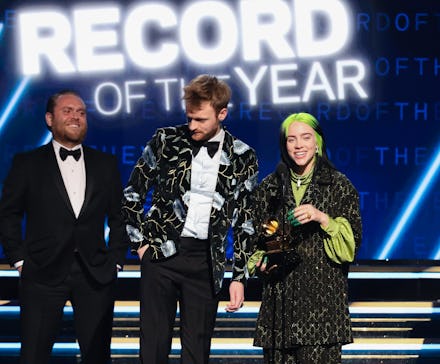Billie Eilish is the "DIY" star the music industry desperately needs

At the 2020 Grammys on Sunday night, Billie Eilish made history as the second artist in the show’s history to win all four major categories: Best New Artist, Record of the Year, Album of the Year, and Song of the Year. At 18, she’s the youngest Grammy winner to win all four nominations on the same night and the first woman to do so. She shared many of her awards with her brother, Finneas O’Connell, who produced and co-wrote her album. While accepting the award for Song of the Year, Finneas said: “This is for all of the kids who are making music in their bedroom today. You’re going to get one of these.”
And that’s a large part of the appeal of Billie Eilish’s massive success — It seems like she went directly from making music in her bedroom with her brother to getting number one hits and standing on the Grammys stage to accept their most prestigious awards. Obviously, it wasn’t as direct of a course as that, but there was certainly a DIY element about Eilish’s image. It seemed like there was more accessibility to making music and making it big in an industry where Billie Eilish, a girl whose fame was first fostered on Soundcloud and Instagram, comes out on top.
Eilish is supposed to be the answer to the industry’s precarious future: a streamable pop sensation, someone who could deliver chart-topping singles and then a number one debut album. It’s something that other pop icons are struggling with — Selena Gomez and Justin Beiber begged their fans to stream their music to get their songs to number one, in what can only be called some of the most dystopic social media campaigns to have ever existed.
Eilish herself is the first to admit that the journey from the two-bedroom Highland Park home where Eilish grew up with her brother and parents to winning Grammys wasn’t a direct trip. “Everything that’s being said about me and what I’ve created,” Eilish told Billboard in the Spring of 2019. “I keep having to think of it like I’m not me because it is just a name. It’s like a brand, which I own and I have the rights to, but it’s also something else. It’s a very strange feeling.”
Her team consists of 16 people, a few of whom have been developing Eilish into the star she is today since 2015 when she released the song “Ocean Eyes.” She has two managers, two booking agents, and is signed to Interscope’s label The Darkroom. Since 2015, her natural talent has been shaped, molded, and branded into the Billie Eilish that performed at Staples Center on Sunday night.
The positioning of streaming as the future of the music industry has been bolstered by the young generation of artists to which Eilish and her peers belong. Lil Nas X made history and broke records with “Old Town Road” and its remixes, which became the longest-running number-one song in history — and when he finally fell to number two, he was bumped off by Eilish’s “Bad Guy.” While “Old Town Road” did rise to the top through savvy maneuvering of its own, Lil Nas X didn’t have the kind of early music industry support that Eilish had until well after his viral fame was established. His first time performing live was after Billy Ray Cyrus contributed to the “Old Town Road” remix.
There’s certainly a remarkable quality to the type of fame both of these young artists were able to cultivate rather quickly. They are part of a new era of music born from the internet. Yet, at the same time, Eilish’s success isn’t as straightforward a DIY success story as arbiters of her image might like. Her team has successfully re-calibrated much of the music industry’s most classic marketing tropes for a new generation. In an October edition of the newsletter of Penny Fractions, David Turner identifies this succinctly: “Billie Eilish’s story is one of an industry desperate to make a broken model appear well-functioning.”
Apple, Youtube, and Spotify tripped over themselves trying to get exclusive content out of the teen star — Apple has secured the rights to a documentary about her rise to fame, Youtube did an "Artist Spotlight" about her, and Spotify created pop-up experiences for her fans attached to her album release. Eilish never went steady with any of them, though Apple is touting their documentary as one way their Apple + platform will edge ahead in the streaming wars.
Upon accepting the award for Album of the Year, Eilish wasted no time in distancing herself from the win: “Please sit down. Can I just say that I think Ariana deserves this?” Eilish asked. She seemed slightly mortified she was on stage again. Ariana Grande waved off the compliment, but there was something too true about Eilish’s unease at winning, as if she, too, could sense the machinations at play. Maneuvers by a voting academy embroiled in scandal.
This is not to say that Eilish is not talented. Her music is good. It’s airy and weird, and her voice has the emotional depth and crooning edge that lends well to the heady pop production it plays over. But the people who stand to gain the most from the idea of Eilish as a DIY pop star who came out of nowhere aren’t the millions of kids recording intimate, vulnerable music in their bedrooms, but the music industry players who need audiences to see the advent of streaming as something decidedly more democratic than it is.